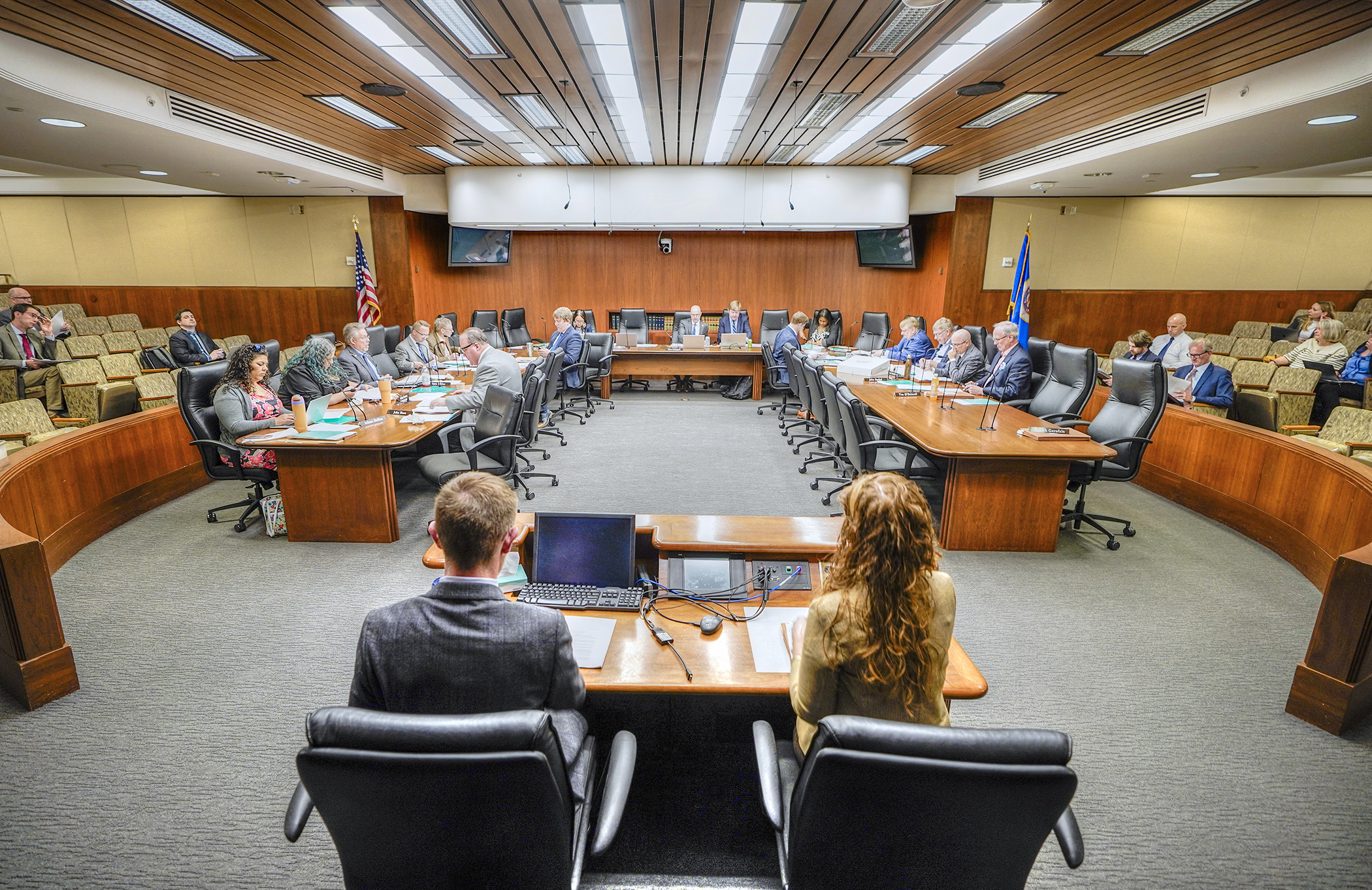House Property Tax Division completes its work
If where you live has the word, “township,” in its name, aid from the state would increase. Small resorts could get a break on their property taxes. Seven Minnesota cities could establish tax increment financing districts. And you might pay a little less for dinner or a drink in downtown Minneapolis.
Those are among the changes recommended in the House Property Tax Division report, which, after about an hour of Monday-morning discussion, was sent to the House Taxes Committee.
Sponsored by Rep. Dave Lislegard (DFL-Aurora), HF5198, updated by a delete-all amendment, is likely to be incorporated into this year’s House tax bill, which is expected to be introduced Wednesday.
Would the bill cut your property taxes? Not directly, no. Those decisions are made at the local level. But the state can alter policy and increase state aid, often resulting in more money in municipal, county and school district coffers and local tax levies holding relatively steady or even decreasing.
Here are some of the bill’s recommended changes.
Property tax aids and credits
If you own a class 1c homestead resort, your valuation tiers could increase by between $500,000 and $900,000, which might result in lower property taxes.
If you live in a township, your share of state aid may grow, as the total town aid appropriation under the Local Government Aid program would increase to $11.5 million, and the entire amount would be available to your township, as opposed to the percentage currently listed in law.
Tax abatements for land banks of up to five years would be made possible by the bill. Those are nonprofits that acquire, hold or manage vacant, blighted, foreclosed or tax-forfeited property for future development, redevelopment or disposal. It would also expand their purpose to include developing affordable housing.
 Staff from the nonpartisan House Research Department present the division report to the House Property Tax Division April 15. (Photo by Andrew VonBank)
Staff from the nonpartisan House Research Department present the division report to the House Property Tax Division April 15. (Photo by Andrew VonBank)Property tax exemptions would be provided for some property owned by the Grand Portage Band and the Leech Lake Band of Ojibwe. And the city of Stewart would have its local government aid penalty forgiven.
Iron Range changes
Property is often taxed differently on Minnesota’s Iron Range. That region has a taconite relief area in which taconite mines and processing plants are subject to a production tax based on tonnage produced. Those revenues are then apportioned through several different taconite aid programs, each with its own distribution formula.
Among the changes in Iron Range taxation, the bill would:
- increase the maximums for the taconite homestead credit;
- change the property tax statement for commercial-industrial property;
- modify the distribution of the taconite production tax;
- provide transfers from the Douglas J. Johnson economic protection trust fund and taconite economic development fund; and
- authorize the issuance of bonds by the commissioner of Iron Range resources and rehabilitation.
TIF districts and special local taxes
Current tax increment financing laws would be amended for the cities of Ramsey, St. Paul and Maple Grove. And new special tax increment financing authority would be provided to Brooklyn Center, Eden Prairie, Edina, Minnetonka, Moorhead, Plymouth and St. Cloud.
There would be a change in statute regarding how “accommodation intermediaries” are taxed, and Minneapolis would have its downtown taxing area expanded and the rate of food and beverage tax within it reduced from 3% to 2.5%.
Other changes
Cities would be allowed to create land-value taxation districts that could be taxed in a way that excludes improvements, or, conversely, buildings that have fallen into decay. And South St. Paul would receive $100,000 in fiscal year 2024 for planning and development costs within the city.
An amendment was voted down that would have omitted the bill’s section on land-value taxation districts, with Rep. Tim O'Driscoll (R-Sartell) saying, “I think that this will ultimately end up at the Supreme Court. … We open ourselves up to litigation, and that litigation costs money.”
Rep. Aisha Gomez (DFL-Mpls) responded that similar laws are in effect in Pennsylvania and Michigan with no legal challenges.
Other unsuccessful amendments would have created an agricultural water quality credit, limited property valuation increases, and placed a moratorium on tax increment financing district changes for some cities.
[MORE: View the spreadsheet]
What’s in the bill?
The following are selected bills that have been incorporated in part or in whole into the Property Tax Division report:
- HF1342 (Elkins)
- HF2436 (Hansen)
- HF3414 (Coulter)
- HF3585 (Bahner)
- HF3604 (Klevorn)
- HF3715 (Agbaje)
- HF3864 (Lislegard)
- HF4265 (Norris)
- HF4301 (Gomez)
- HF4340 (Niska)
- HF4494 (Wolgamott)
- HF4540 (Kozlowski)
- HF4771 (Acomb)
- HF4942 (Youakim)
- HF4973 (Pinto)
- HF4990 (Davids)
- HF5046 (Kotyza-Witthuhn)
- HF5062 (Sencer-Mura)
- HF5164 (Vang)
- HF5177 (Gillman)
- HF5198 (Lislegard)
- HF5213 (Keeler)
Related Articles
Search Session Daily
Advanced Search OptionsPriority Dailies
Speaker Emerita Melissa Hortman, husband killed in attack
By HPIS Staff House Speaker Emerita Melissa Hortman (DFL-Brooklyn Park) and her husband, Mark, were fatally shot in their home early Saturday morning.
Gov. Tim Walz announced the news dur...
House Speaker Emerita Melissa Hortman (DFL-Brooklyn Park) and her husband, Mark, were fatally shot in their home early Saturday morning.
Gov. Tim Walz announced the news dur...
Lawmakers deliver budget bills to governor's desk in one-day special session
By Mike Cook About that talk of needing all 21 hours left in a legislative day to complete a special session?
House members were more than up to the challenge Monday. Beginning at 10 a.m...
About that talk of needing all 21 hours left in a legislative day to complete a special session?
House members were more than up to the challenge Monday. Beginning at 10 a.m...